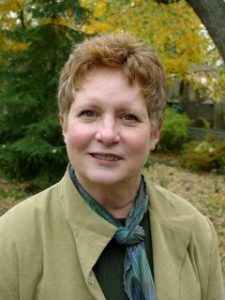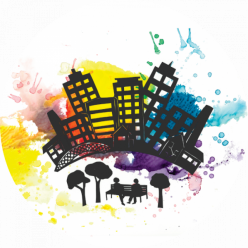In our in conversations with … series of posts we introduce you to the people behind theTransforming Stories, Driving Change project—the artists, researchers, and community participants who desire Transforming Stories to make a substantive contribution to civic engagement in the city of Hamilton.
Catherine Graham is a co-Principal Investigator on Transforming Stories, Driving Change and an Associate Professor, Theatre & Film Studies, Gender Studies and Feminist Research, and Cultural Studies and Critical Theory in the Faculty of Humanities at McMaster University.

“Nobody is going to create a world that we all really want to live in if there is no pleasure in doing it. I’ve really come to believe that our emotions tell us where we fit in the world at any given moment. If you’re miserable doing something, something is wrong, something needs to be corrected. So I’d say play together and pay attention to what pleasures arise through this kind of purposeful play, because how everyone feels will be an important clue about what a mutually meaningful world might look like.”
Catherine, how did you conceive the Transforming Stories project?
It really came out of a number of conversations with Chris Sinding. We recognized pretty quickly that we had similar interests but were coming at this kind of community-engaged performance work from different directions. I came into academic life out of work using theatre to do community engaged work for social change. When I started getting asked to teach other people how to do group facilitation the way I did it, I realized I couldn’t teach them because I did it so instinctively I couldn’t explain why I was doing what I did.
After a chance meeting, a former professor encouraged me to go back to school for a master’s degree in Comparative Literature as a way of trying to think some of this through. I was a single parent and had been out of school for about 14 years at that point, so it was a bit of a scary prospect, but in the end I did it. What I ended up studying was, effectively, cultural translation, and I think that a lot of what we’re doing in this kind of theatre work is a kind of translation. One of the things you pay attention to in translation studies is what assumptions about the situation are already embedded in the way we’re expected to talk about it. Theatre is a way we can make those assumptions more visible so we can challenge them when we need to – and that is at the core of this project.
Transforming Stories was originally a pilot project. How will this differ from the pilot?
It will differ mostly because of the groups that we work with. I feel it is important to work with multiple groups as it does two things. One, in terms of civic community discourse, is that, hopefully, it may get people talking to each other, and really hearing each other, who have not been talking to each other before.
I think research-wise, it is especially important for us to do this with multiple groups. I think the danger of this work is that we do an exercise or use a technique that works really well in one place, but then we try to generalize it everywhere. So, I think working with multiple groups will help us understand much better what pieces of this performance-as-research method are essential, what we want to repeat almost every time, and where we need to be flexible. How to recognize the difference is one of the things we don’t necessarily know yet and truly need to figure out.
How is this project different from other community engaged performance projects?
For one, this is not a knowledge translation project. I think what we usually understand by knowledge translation is that academics go and figure something out and then create a performance that is accessible to non-academics about what they’ve discovered. That is not our intention. With this project, the analysis and the performance creation will happen more or less simultaneously. So, it really is performance-as-research. When we try to figure something out we will figure it out by creating a situation between human beings, in the form of characters, and create the possible worlds or set of conditions within which that kind of relationship could happen. And that is what we will present to the public, but it will not be presented to the public as a finished piece.
The two pieces we did for the pilot end by requesting something of the audience. So, we consider the audience to be as much a part of the performance-as-research process as the community participants who agree to perform. A big part of what we are doing here is we are asking something of the audience – we’re asking the audience to put themselves in the picture.
We’re trying to get people participating in a mutually meaningful world, recognizing that we all live in the same city. We all live in this world and we all affect each other – whether we intend to or not and whether we know it or not. With luck, this work may lead to a sense of being responsible for each other’s well-being and not just for solving a particular problem.
You mention participating in a mutually meaningful world as one of the aims of the project. Are there any other aims that you feel we should talk about?
I think the big goal is to figure out how to bring these voices into public discussion who are not currently being heard. Which doesn’t mean that they’re not speaking. We live in a society where we have freedom of speech. We don’t necessarily have the freedom to be heard. So, we’re thinking: what are some of our habits of communication that are excluding some of these voices who are affected by/who affect the city we are living in? If we truly are a democracy, these voices need to be heard.
As a practitioner of performance-as-research what advice would you give others who are thinking of doing a project in a similar way as Transforming Stories?
Everything depends on who is in the room. It is really important to think carefully about who is in the room.
And have fun. Play with imagined situations and help others play too. Nobody is going to create a world that we all really want to live in if there is no pleasure in doing it. I’ve really come to believe that our emotions tell us where we fit in the world at any given moment. If you’re miserable doing something, something is wrong, something needs to be corrected. So I’d say play together and pay attention to what pleasures arise through this kind of purposeful play, because how everyone feels will be an important clue about what a mutually meaningful world might look like.

